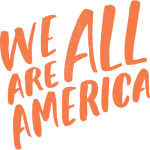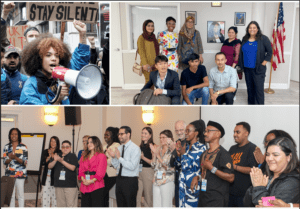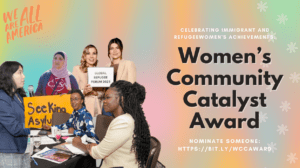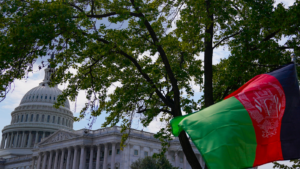Interview with Dr. Samiya Tabasum, Afghan Housing & Community Navigator — Florida.
This medium article is part two of a three-part interview series highlighting the Afghan Housing & Welcoming Community Navigator program from We Are All America. This second interview highlights the work of Dr. Samiya Tabasum, the Afghan Housing & Community Navigator for We Are All America & Florida Immigrant Coalition working with Afghan refugees in Florida.
Can you introduce yourself and your background? (Please feel free to include any relevant education experience, prior work experience, volunteering, etc.)
My name is Dr. Samiya Tabasum, and I am a Professor of Law from India who has authored five books. My field of expertise includes Family Law, Intellectual Property Rights (IPR), Human Rights, Human Trafficking, and Immigration Law. I have organized international and national conferences and have attended and submitted more than 32 research papers.
In 2018, I was offered a scholarship to pursue my Master’s degree in Intercultural Human Rights. I arrived in the United States on a student visa. Unfortunately, my country of Kashmir was stripped of autonomy, which meant that I could no longer contact my family for about a year. Due to these circumstances, I became stuck in the United States and could not go back home. In December 2019, I graduated with honors and joined the US workforce, where I worked on personal injury cases.
What made you interested in becoming the Afghan Housing & Welcoming Community Navigator?
In 2018, I began to involve myself in my community in Florida, where I volunteered at Domestic Violence Shelters assisting domestic violence victims in getting connected with resources to restart their lives. In addition, I would also help people apply for federal benefits. Before joining We Are All America, I assisted incoming Afghan refugees in a volunteer capacity.
My previous experience volunteering with Afghan refugees made me interested in the Afghan Housing & Welcoming Community Navigator position. My own experiences with immigration, as well as my professional background, further encouraged me to apply.
What has your experience been like working as the Afghan community navigator in Florida?
My primary role as the Afghan Housing & Welcoming Community Navigator is to help Afghan community members get connected to resettlement agencies to have the support and resources they need to succeed in their new communities. With the consent of the resettlement agencies, I help individuals with the logistics of getting integrated into their communities. This can include assisting clients in finding and scheduling doctor’s appointments, opening bank accounts, job placement, supporting clients in accessing free healthcare clinics, completing paperwork, and finding accessible housing. So far, I have assisted over 400 clients.
In your experience, what are some of the challenges that Afghan community members have to face?
There are many challenges that our Afghan clients face. First is the challenge that comes with the language barrier. The clients I work with speak Dari and Pashto, so I often have to seek volunteers who can interpret for our clients.
The second challenge is related to cultural differences and barriers. As with any incoming refugees and immigrants, they are adjusting to a new culture, which can be complicated and overwhelming. Newcomers may find it difficult to communicate with locals in regards to purchasing a home, starting utility services, navigating employment, and using public transportation.
Lastly, understanding the resettlement process in the U.S. can be overwhelming for newcomers. The US Resettlement Program is still facing many challenges, including local offices facing limited capacity and scarcity of resources. They face barriers from federal agencies and institutions. Furthermore, supporting and meeting the needs of clients with more complex cases can be difficult. The resettlement process is challenging for both refugee serving partners and our newcomers.

How have you been able to assist families in integrating into their new communities?
With the help of volunteer interpreters who speak Dari and Pashto, I can overcome language barriers to assist Afghan refugees in integrating into their new communities. I work primarily with families, including pregnant women and children. This can include ensuring that pregnant women receive the prenatal care they need by connecting them to free clinics, scheduling doctor’s appointments, or filling out essential paperwork.
For example, I helped a client by the name of Rabia, a young mother of a 2-and-a-half-year-old toddler. She was pregnant with her second child and needed assistance accessing prenatal care. I was helping her throughout her pregnancy by taking her to OBGYN, having ultrasound appointments, and getting her to get her blood drawn. Luckily, she gave birth with normal delivery to a male child and was able to receive housing shortly after.
What has been the most rewarding aspect of your position?
The most rewarding aspect of my position is being able to help people who are stateless, homeless, and jobless by connecting them to the resources they need. I do so by working with clients in job placement, providing links to available positions, or assisting them in the job search process.
I’ve been able to organize workshops on cultural competency and two roadside & traffic signs workshops with over 80 participants. I was very engaged in the roadside & traffic workshop, where I helped in the presentation by demonstrating bike signals and explaining the crossing the road signs. I also sent them a driving booklet that was translated into Dari and Pashto to assist them in learning how to navigate learning the local transportation system.
I am happy to help refugees who have great hopes after landing in the United States.

How do you engage in refugee and immigrant advocacy with We Are All America?
On a national level, I have helped co-facilitate a nationwide navigator training in partnership with the National Partnership for New Americans (NPNA) with over 120 attendees. I also started an Afghan Taskforce, where I have brought community and organizational partners together to address the needs of our Afghan community members.
For advocacy, I have participated in Refugee Advocacy Days. Before Refugee Advocacy Days, I attended the RCUSA Leadership Development workshops co-hosted by We Are All America. I learned skills about speaking with elected officials, best practices, and local government structures. After attending the workshops, I met with the U.S. Senator of Florida, Marco Rubio, to discuss the adversities and triumphs that my clients have faced.
Lastly, I have joined the Opportunity For All Table, where I have attended leadership development workshops to further my skills as well as engaged further in advocacy efforts happening nationwide.
Testimonies
Please include one testimony from a community partner such as a resettlement agency, non-profit organization, or other organization you have worked closely with. In addition, please include at least one testimony from a community member who you have helped. Their identity can be kept confidential.
“In January 2022, We Are All America hired Dr. Samiya Tabasum as an Afghan Community Housing & Welcoming Navigator with the role of ensuring that Afghan communities arriving in Florida through the resettlement process or other means are supported in areas of housing, immigration and other areas of integration. She has supported my role as a refugee organizer. Through our hotline, we receive calls from communities including Afghans who need help we have referred them to Dr Samiya for help and they received appropriate support. She has also supported the Afghan Housing and Welcoming Task Force in its role to help Afghan communities.” Pierre Uwimana, Florida State Refugee Organizer, Florida Immigrant Coalition/WAAA



